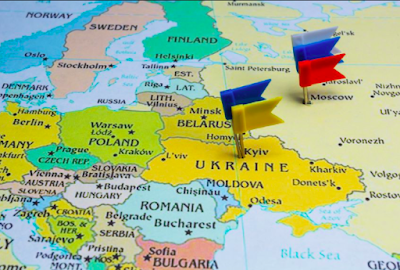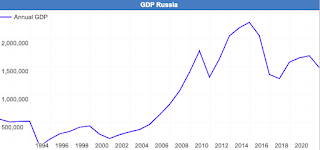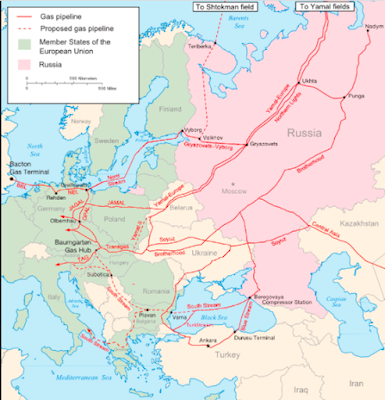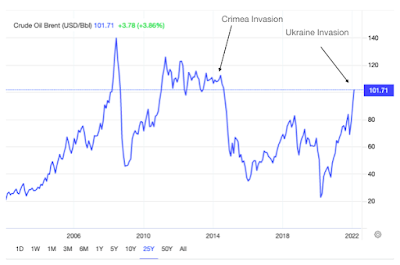There are several reasons why Vladimir Putin may have wanted to invade Ukraine.
1) Ukraine borders Russia and the Ukrainian have cozied up to the West in recent years and have expressed a desire to join NATO. Putin views this as a threat to his security as much as the United States would if Canada was talking with China about a mutual defense package.
For those unfamiliar with the geography, here is a map that puts it into better perspective.
 |
| Source: https://gsy.bailiwickexpress.com/gsy/news/skz/#.YhwHVBNKjs0 |
Here is another perspective to give you an idea where Ukraine is located by showing what happens when war breaks out over a country and commercial flights make sure they are not flying over the war zone. Yes, this is Ukraine almost perfectly outlined by the commercial flight patterns.
Of course, there is always someone that does not get the memo.
Air India Fight 121 on February 25.
In fairness, I have seen reports that this flight was going to rescue Indian students in Ukraine.
2) Ukraine was part of the Soviet Union until 31 years ago. Ukraine was also part of the Russian Empire beginning in the late 18th century under czarist rule until the Bolshevik revolution occurred and that empire collapsed in 1917. Ukraine attempted to assert its independence in the succeeding years but was ultimately partitioned in the 1930's between the Soviet Union and Poland. When you add it all together Ukraine has actually been aligned with Russia for about 200 of the last 240 years.
Most Ukrainians want independence but, due to the long history with Russia, there are also many in the country who feel an affinity to Russia. Putin sees himself as a protector of those people (many who speak Russian) and also has a vision of once again returning Russia to the glory days of the Soviet Union or Russian empire.
3) Ukraine has been called the "breadbasket of Europe". Ukraine is a major exporter of wheat and corn in the global agricultural market. Putin may want to insure that he has access to a reliable food supply for Russia. I don't think Putin has bought into the climate change agenda that would have him believe that Russia is going to soon be seeing bumper harvests in Siberia. Ukraine gives Russia food security.
4) Of course, there is nothing more important for Russia than energy. Russia is extremely reliant on its oil and gas sector to power its economy. Oil and gas revenues account for almost 20% of Russia's GDP. Oil and provides 40% of the government's revenues. 60% of its global exports are from oil and gas.
Despite the fact that Russia likes to believe it is a global superpower, its economy is far from it. Due to its reliance on oil and gas prices, Russia's GDP had actually been contracting during the Trump years due to low oil and gas prices..
Its GDP was $1.5 trillion in 2020. Due to the increase in oil and gas prices, it was estimated at $1.6 trillion in 2021 and was expected to grow to $1.7 trillion in 2022.
 |
| Source: https://countryeconomy.com/gdp/russia |
For context, that is about 7% of the the United States economy.
Australia has almost the same amount of GDP as Russia but has 1/6 of the population.
To put a finer point on all of this, consider the fact that the United States has more debt owed on student debt ($1.9 trillion currently) than Russia's entire GDP!
In the past, Russia was reliant on gas pipelines that crossed Ukraine to get its natural gas to markets in Europe. Ten years ago 80% of natural gas bound for Europe had to cross Ukraine. Since the Nord gas pipeline was opened under the Baltic Sea that percentage has dropped to below 50%. If the Nord 2 Pipeline becomes operational it could drop to around 20%.
Putin clearly has always been uncomfortable how vulnerable Russia was with so much of its energy exports having to be transported over those pipelines crossing Ukraine.
You can see from this map how Ukraine is a main hub for pipelines going from Russia to central Europe.
 |
| Source: https://en.wikipedia. |
I have no idea what issues motivated Putin to act as he did. However, a combination of all of these reasons may be involved.
What seems easier to understand is why Putin acted now.
Recall that Putin moved on Crimea in 2014 and Obama, Biden and the Europeans basically let him have it.
What was the price of oil at that time?
Over $100 per barrel.
What is it now?
Do you see a pattern?
 |
| Source: https://tradingeconomics.com/commodity/brent-crude-oil |
Putin has only been able to move on Ukraine now because he believes he has the financial resources to do so with higher oil and gas prices.
Despite all the narrative about Trump and Putin, the reality is that Trump's energy policies in the United States that helped drive down energy costs hamstrung any of Putin's expansionary ambitions. Russia simply did not have the money to fund any aggressive moves with oil and gas prices being so low.
Biden opened the door for Putin to become aggressive when he put in place policies that curtailed US drilling and the Keystone pipeline and resulted in increased oil and gas prices.
Biden's Afghanistan debacle and the sorry state of his first year in office also had to embolden Putin to move on Ukraine now.
Germany made matters worse by buying into the climate change agenda and shuttering its nuclear power plants thereby making it even more dependent on Russian natural gas to keep their factories humming and the lights and hear on in German homes. I wrote about this previously in this post.
Putin believed he had the leverage to invade Ukraine now with this combination of policy errors. He has the high oil and gas prices he needed and he also knew Germany and Europe would be in a significant energy bind without Russia's natural gas.
Putin must have thought that he would never be holding a better hand of cards.
Whatever Putin's reasons, he has placed an enormous bet on the outcome.
He is betting his legacy as a leader, and perhaps his life, on the outcome.
That bet also puts the rest of the world at risk.
At a minimum, it looks certain to put more pressure on global prices of oil, gas and food. More inflation is likely.
The sanctions against Russia (including the attempts to ban Russia from the SWIFT international system of interbank payments) could eventually undermine the dollar as the world's reserve currency if Russia would team with China to develop an alternative system. That would be disastrous to the U.S. dollar.
The fact is that nobody knows where this goes once the wheels have been set in motion.
We are now in a high risk game of poker.
This is also a good time to think back on all of the misinformation and outright lies the Democrats and the mainstream media did in pushing the Russian collusion story involving Donald Trump.
We are now finding out that it was nothing but a political hit job orchestrated by the Clinton campaign in 2016 and perpetuated by the mainstream media and Democrat party for the entire four years that Trump was in the White House.
Ask yourself how much all that harmed the United States and has contributed to where we are today.
It could not have been helpful. I know that.
Anyone with any critical thinking skills should have seen that Trump's position on energy independence, opposition to the Paris climate accord and NATO funding were directly counter to Russia's interests.
I wrote about "The Real Russian Scandal" in April, 2017.
This might be a good time to re-read what I wrote in light of what has developed over the last five years.
The Real Russian Scandal
(originally published April 2, 2017)
A lifetime of experience tells me that people are motivated first and foremost by their self-interest, particularly their economic self-interest.
The same is true for countries.
Would the United States even be involved in the Middle East but for our dependency on oil from that region over the last half century?
Most wars that have been waged over the years have been to either protect or promote economic interests.
There is a lot of talk in the media today about Russian influence in our Presidential election. All of which is to have us somehow believe that Putin and the Russians wanted Trump to win and Clinton to lose.
Of course, the Director of the FBI and Obama's Director of National Intelligence have already told us that there is absolutely no evidence that one vote was changed as a result of Russian interference.
However, we are being told the Russians still sought to influence the election in order for Trump to win.
Let's take a look at that question in terms of economic self-interest to see how logical that argument is.
Russia's economy is a mere fraction of that of the United States. Russia's GDP last year was $1.3 trillion. That is about 7% of what the GDP of the United States is ($18.037 trillion).
Let's put that into better context.
Total student loan debt in the United States today ($1.491 trillion) is larger than the entire Russian economy.
Three states (California, Texas and New York) each have larger GDP's than does Russia.
What is the most important segment in the Russian economy?
Energy. There is not anything even remotely close after that.
The quote below is from an energy profile and analysis of Russia that was published in 2015 to give you an idea how significant energy dollars are to the Russian economy.
Russia is a major producer and exporter of oil and natural gas, and its economy largely depends on energy exports. Russia’s economic growth is driven by energy exports, given its high oil and natural gas production. Oil and natural gas revenues accounted for 50% of Russia’s federal budget revenues and 68% of total exports in 2013.
50% of Russia's federal budget is tied to oil and natural gas revenues?
68% of total exports are related to oil and gas?
Russia's proven oil reserves are just about twice what the United States has.
Russia has the largest gas reserves in the world and is the second largest producer of dry natural gas.
Russia also has the second largest reserves of coal in the world (behind the United States) and is the world's third largest exporter of coal. If you are wondering, the United States ranks fourth in coal exports despite having the largest reserves. Australia and Indonesia both export more coal than Russia.
Does all of this suggest to you that energy prices, particularly the price of oil and gas, are very, very important to the Russian economy?
In fact, there is much to support the proposition that much of the Crisis in Ukraine was driven by energy concerns including Russia's continued ability to use pipelines across Ukraine to get to their important markets in Europe and recently discovered natural gas fields off the coast of Ukraine. This is not to suggest there were not also defense and nationalistic reasons for Putin to do what he did, but it is hard to ignore the link between energy revenues and the economic fortunes of Russia. Those energy revenues are also very critical to the regime of Vladimir Putin. After all, hungry and unhappy people often become rather angry about their leadership.
Of course, that crisis led to significant economic sanctions being placed against Russia by both the United States and Europe which serve to limit the ability of Russian energy companies to access U.S oil technology and U.S. and European capital markets for energy-focused projects.
This chart shows how Crude Oil Prices (Brent-Europe) have moved since the beginning of 2014. Prices today are less than half of what they were three years ago.
You can see the effect that lower oil prices had on the Russian ruble in 2014 as oil prices dropped in the graph below. It should be noted that the impending effects of sanctions undoubtedly also had effects on the value of the ruble during that period.
 |
| Credit: http://www.russia-direct.org/rd-explainer-oil-prices-and-russia#explanation-9 |
The situation is not much different today. Oil is at $50 per barrel and the ruble is trading at 56 to the U.S. dollar. In dollar terms, the price of oil has been cut by more than half. To make matters worse for Russia, the ruble only buys half as many dollars.
Considering everything above, what is the most important factor for Russia's long-term economic well-being?
Higher oil and gas prices.
Of the two candidates running for President, which of the two candidates was more likely to initiate policies that would lead to increased oil and gas prices?
Was it the candidate who wanted to build the Keystone pipeline, lift the Obama moratoriums on drilling on federal lands, lift the restrictions on new drilling technologies, rescind Obama-era EPA rules on drilling and coal and end the excessive regulations of fossil fuels?
All of these positions of Donald Trump would serve to lower oil and gas prices by increasing U.S. and global supply.
Hillary Clinton's policies would have done the exact opposite. In fact, she was on record during the 2016 campaign as saying that "we need to move away from coal and all the other fossil fuels as energy sources". That was about the same time she was saying she would put all of the coal workers in the United States out of work. She might have thought those statements were in her own self-interest in order to play to her liberal left base of voters. However, it could not have been further from our nation's economic self-interest.
At the same time, if you were sitting in Vladimir Putin's chair, wouldn't those positions be music to your ears? What could be better for Putin than a U.S President who wanted to exorbitantly raise the prices of fossil fuels in order to make green energy projects more viable?
The argument could be made (and is the most plausible reason for any Trump favoritism on the part of Russia) that Putin figured he might be able to cut a better deal with Trump on lifting the sanctions than he could with Clinton. However, this would have not solved the real problem for Russia---low oil and gas prices. That can only be accomplished by changes in the supply/demand relationship for oil and gas.
However, even if this was the case, who would you rather be negotiating against on the subject of sanctions? Donald Trump or Hillary Clinton? Don't you think that Donald Trump would get something in return that Hillary Clinton wouldn't even dream of if this subject came into play?
And do not let it be forgotten that Secretary of State Hillary Clinton is the person who in October, 2010 signed off on the transaction allowing Russian energy company Rosatom to effectively acquire and control 20% of U.S. uranium reserves.
If you review the entire Russian influence story based on simple logic, economic facts and self-interest, why would Vladimir Putin and Russia have any reason to prefer Trump over Clinton?
It just doesn't add up in any shape or form when you look at it from that perspective.
And what other perspective could there be other than looking out for your own economic self -interest?
Have you seen or heard any of this reported or discussed in the mainstream media?
That is the real Russian scandal.








No comments:
Post a Comment